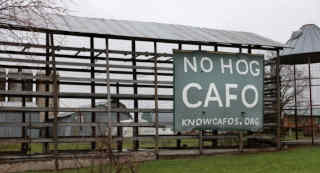“This ordinance is quite simply another case of government overreach,” the Binversies’ attorney Scott Rosenow, executive director of WMC Litigation Center, said in a press release.
He did not respond to a request for an interview. Jenny Binversie directed inquiries to Ben Binversie, who declined to comment.
Eureka’s ordinance, revised in March 2022, regulates large livestock farms, known as concentrated animal feeding operations, or CAFOs. It doesn’t regulate where large livestock farms can go, but how they operate.
The regulations apply to new CAFOs, or smaller facilities with common ownership, that house at least 700 “animal units” — the equivalent of 1,750 swine or 500 dairy cows.
The rules require applicants to apply for an operations permit and submit plans for preventing infectious diseases, air pollution and odor; managing waste and handling dead animals. They also mandate traffic and property value impact studies, a pot of money set aside for cleanups and decommissioning, and an annual permit fee — atop costs to review the application and enforce the permit terms.
Even under that exception, which the attorneys say Eureka doesn’t demonstrate, they contend that more restrictive ordinances cannot add new requirements for which no state standards exist. They also argue Eureka’s ordinance imposes new performance standards that the state must approve, which they say the town hasn’t done.
The lawsuit acknowledges the ordinance’s requirements don’t apply to the Binversies, but the attorneys claim they harm the couple and other Eureka taxpayers because the town will use public funds to compensate local authorities and consultants to review permit applications and enforce the ordinance.
In addition to Eureka, four other northwest Wisconsin towns passed operations ordinances after a developer proposed in 2019 constructing a farrowing operation, known as Cumberland LLC, that would have housed up to 26,350 pigs — the largest swine CAFO in Wisconsin.

An advisory group drafted the regulations to plug gaps in state livestock laws, which they believe insufficiently protect health, property and quality of life. For instance, the Wisconsin Department of Natural Resources cannot regulate issues unrelated to water quality, including air, noise and vehicle traffic.
Meanwhile, Wisconsin’s “right-to-farm” law protects farmers from nuisance claims, and livestock facility regulations restrict the use of zoning to control where CAFOs are sited.
No CAFOs currently operate in Eureka, a Polk County community of 1,700, but unlike other towns’ operations ordinances, Eureka’s requires CAFOs that intend to spread manure on fields within town boundaries to obtain a permit.
A judgment against Eureka might invalidate any Wisconsin municipality’s operations ordinance depending on the scope of a court ruling.
Town chair Don Anderson said he is concerned by the lawsuit, but believes the operations ordinance is important. The town of Trade Lake, where the swine farm was proposed and an operations ordinance also enacted, is not so distant from Eureka.
“We’re just wanting to protect ourselves in case it should happen,” he said.
Outside of the court challenges, state lawmakers recently attempted to preempt local farming regulations.
A bill that would have restricted local control passed both chambers earlier this year before Wisconsin Gov. Tony Evers vetoed it.
The proposal concerned only animal welfare, the administration of medications and vaccinations, and the ways animals are used, but skeptics believed it would have established a legal precedent that could limit any safeguards against potential harms caused by large livestock farms.
A public hearing, where lawmakers discussed the northwest Wisconsin towns, gave them cause to worry.
Click here to see more...